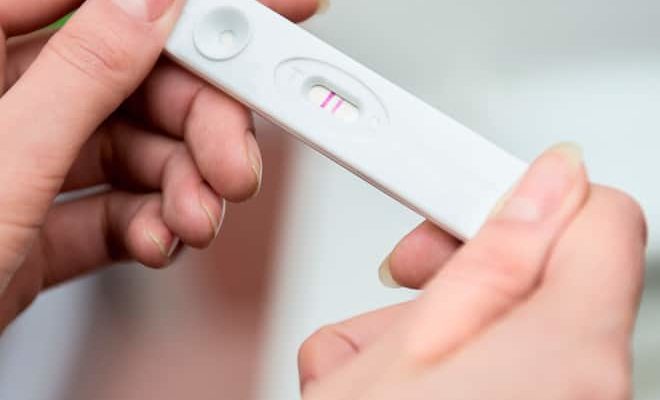
Main content:
Development of 1 week old fetus
Maternal body changes at week 1
Doctor's advice about 1 week pregnancy
Maternal and fetal health at 1 week
Development of 1 week old fetus
1 week fetus development like?
The fetus is not yet formed this week but it still counts as part of the fetal formation . The first week of pregnancy is actually the mother's menstrual week. The expected due date is usually 40 weeks from the first day of your last period. However, in some women who give birth late, pregnancy can last up to 42 weeks.
Maternal body changes at week 1
How does the mother's body change?
Mother's body is preparing to ovulate. Ovulation occurs about 12-14 days from the first day of your last menstrual period before pregnancy. Ovulation is when a mature egg is released from the ovary, moved down the fallopian tube and ready to be conceived. If you are planning to get pregnant, this is the right time to mark and predict the time of your ovulation .
What are the things you need to pay attention to?
Maintain a diet full of vitamins, especially folic acid. Women trying to become pregnant should get about 400 mg of folic acid per day. This reduces the risk of a baby with a neural tube defect (birth defect caused by an abnormal brain development and damaged canal), such as a spinal fracture. To be sure, you can consult your doctor about a folic acid supplement and a diet when you're trying to conceive.
Doctor's advice about 1 week pregnancy
What should mom discuss with the doctor?
Tell your doctor about any medications you're taking, whether they are prescribed or not. You will need to be especially careful when taking the medicine because it can harm the first week fetus. However, mothers should also pay attention not to stop taking prescription drugs without consulting a doctor. The doctor will help you to weigh the benefits and risks of stopping the drug and help you come to a more accurate conclusion.
Ask your doctor:
Should I continue to take prescription and over-the-counter medications?
What to do before pregnancy?
Do I need to get vaccinated against any diseases before pregnancy?
What tests do you need to know?
During this time, you should have a test to check your ovulation date. If you are planning a pregnancy, determining the date of your ovulation will help you know when is the easiest time to conceive. Since every woman's menstrual cycle is very different, it is common to have a menstrual cycle of 28 days, but for some people 21 days or longer for some.
Another thing you need to do is check if you are pregnant or not. Once the eggs are fertilized, you need to wait at least two weeks for this test. Some test methods can detect a pregnant woman on the day she no longer period, others can only detect a week later. Ideally, you should see a doctor if you think you are already pregnant.
Maternal and fetal health at 1 week
What do you need to know to ensure safety during pregnancy?
Many factors can affect conception and the baby is forming in the womb. Such factors include certain drugs, alcoholic beverages and tobacco. Here are some of the things that you need to do before you get pregnant in week 1 to ensure your safety and your baby's safety.
Before getting pregnant, mothers should get vaccinated because during pregnancy, the mother's immune system weakens and the mother is at risk for various diseases. Here are some vaccines to consider:
1. Measles, Mumps and Rubella Vaccines
Measles symptoms include fever, cough, runny nose, and small red spots that appear on the body a few days later.
Mumps is an infectious disease caused by a virus that causes swelling of the salivary glands.
If the mother is infected with one of these two diseases during pregnancy, the mother's miscarriage rate will be very high. Rubella, also known as German measles, has symptoms quite similar to the flu and is often accompanied by a rash. About 85% of babies born to mothers with the condition will have a birth defect such as hearing loss or disability. Usually, mothers have to wait one to three months after getting the measles, mumps and rubella synthetic vaccine to start conceiving.
2. Chickenpox vaccine
Chickenpox is an infectious disease caused by a virus that can cause a mother to have a fever and have an itchy and uncomfortable rash. About 2% of babies born to mothers infected with chickenpox in the first 5 months of pregnancy will have birth defects, deformities, and lower extremities. A mother with chickenpox before labor is capable of transmitting infectious and life-threatening diseases to the baby.
3. Flu vaccine
Doctors and experts often recommend that mothers should get a flu shot during pregnancy. The flu shot is made from dead viruses so it won't harm your unborn baby. You should avoid getting the flu vaccine in the form of a spray called FluMist because it is made from a live virus.
Ideally mothers should consult and consult a doctor when mothers want to vaccinate before starting pregnancy.
The time of pregnancy is when mothers should avoid alcohol, drug use and tobacco products. These substances can harm a mother's fertility, increase the risk of miscarriage and cause birth defects in the fetus. Some of the more common disabilities include fetal alcohol intoxication syndrome, breathing problems, low birth weight and others.
Check and consult a doctor as soon as you have any concerns or have any health-related problems.












